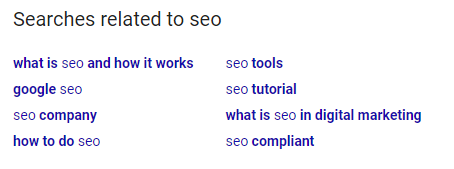What is Keyword Research?
Keyword research is the process of uncovering the priority terms, phrases, and questions to optimize your content around. These terms are the foundations for optimizing your metadata, on-page copy, and even internal links.
Keyword research is one of the building blocks of SEO. And, really, any successful digital marketing. By uncovering and optimizing around how people search for your product or service, you are ensuring your content speaks the same language as your users.
As an added benefit, search engines are more likely to understand the contextual relevance of your page. This means you are more likely to rank for queries you want to rank for - which means you get the quality of traffic you want.
There are three primary considerations for including a keyword in your targets for a page:
Intent
Do the search results for the query match the intent of your page? Sometimes when doing keyword research, you'll come across a query where Google shows results that you weren't expecting.
For example, you might think a keyword you're searching has low-funnel, purchase intent. But when you search, Google only shows educational, higher-funnel content on the first page. This means you should either exclude this keyword from your targets or change the intent and content on your page.
Competition
Another factor to keep in mind when doing keyword research is the competition within the search results.
Drop a keyword you're considering targeting into Google, and take a look at the domains that show. Are the chances good that you'll be able to rank here with a strong piece of content? Or is the quality of domains so high that you'll have trouble breaking onto page 1? If so, it might be worth taking a look at some longer-tail queries where the competition might not be as high.
Prioritization
You'll also want to have some kind of prioritization to the queries you're trying to optimize for. Typically, SEO practitioners will look at Monthly Search Volume (MSV) for this. Tools like SEMRush and Google Keyword Planner provide their own estimates of how many times a query is searched in a given month.
When Should You Do Keyword Research?
In an ideal world, keyword research should be one of the guiding, foundational activities you do whenever you create a new piece of content. Sometimes, though, timelines and workflows just don’t work out that way.
In these cases, keyword research can be done after a piece of content has gone live. In fact, in some ways this will make your task a little easier because your content will likely already have established some keyword rankings so you can start to get a sense of the context and intent Google sees behind the page.
How Do I Do Keyword Research for SEO?
There are many tools and processes for doing keyword research. In fact, every SEO practitioner you talk to likely has their own take on how to do it.
How you do keyword research will likely be an evolving process and will likely vary depending on the project. Here are a few tools (some free and some paid) to help you get started:
Often though, the best place to start is the search results themselves. Throw your target head terms into Google and browse through the results that show up. Will the content you create fit with what Google sees as the most relevant results for your query?

If "Yes", take a look at the "Searches related to [Your Query]" section at the bottom of the results page. Chances are this will have some more keywords worth targeting with your content.
If "No", this is an opportunity to dig further into how users are searching for your topic. If Google isn't matching what you believe the intent of your keyword is with the results it shows - take a step back. The users you're looking to attract might be searching for your chosen topic using other keywords.


